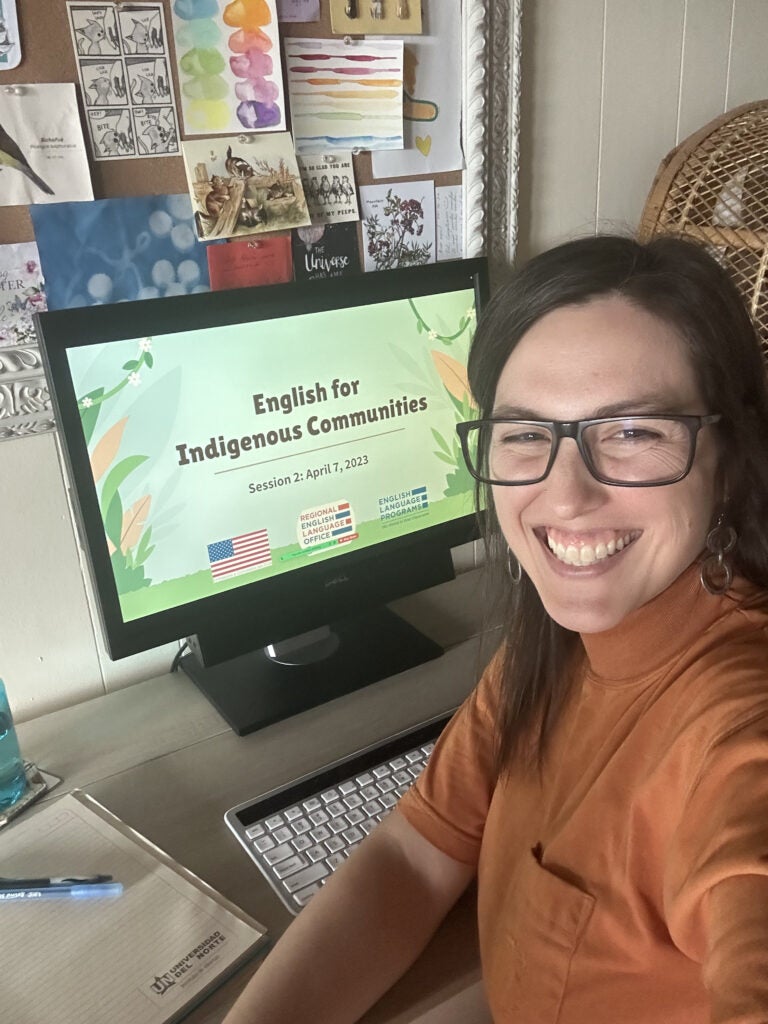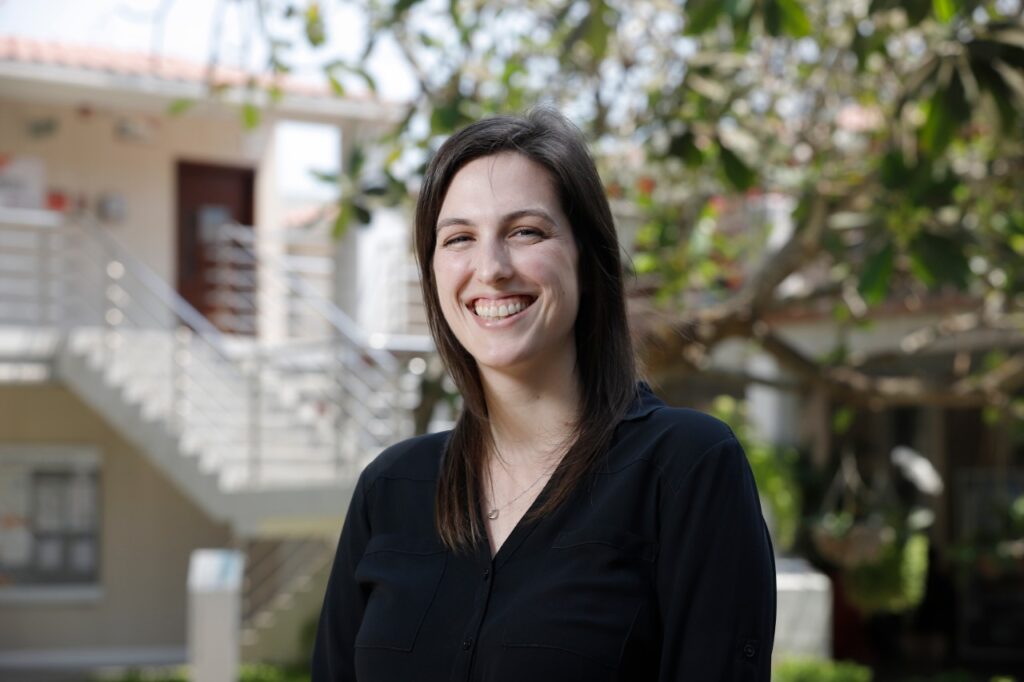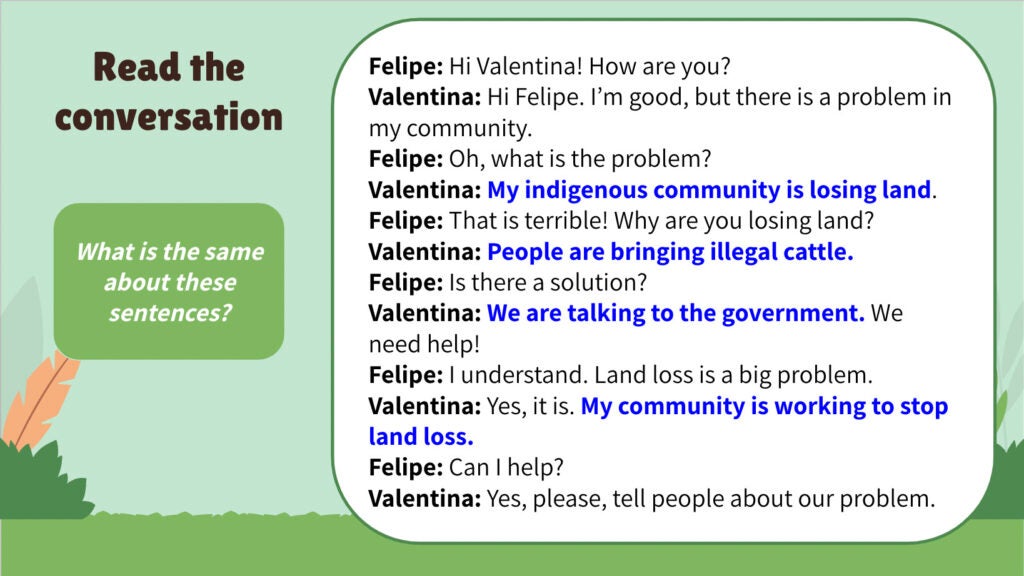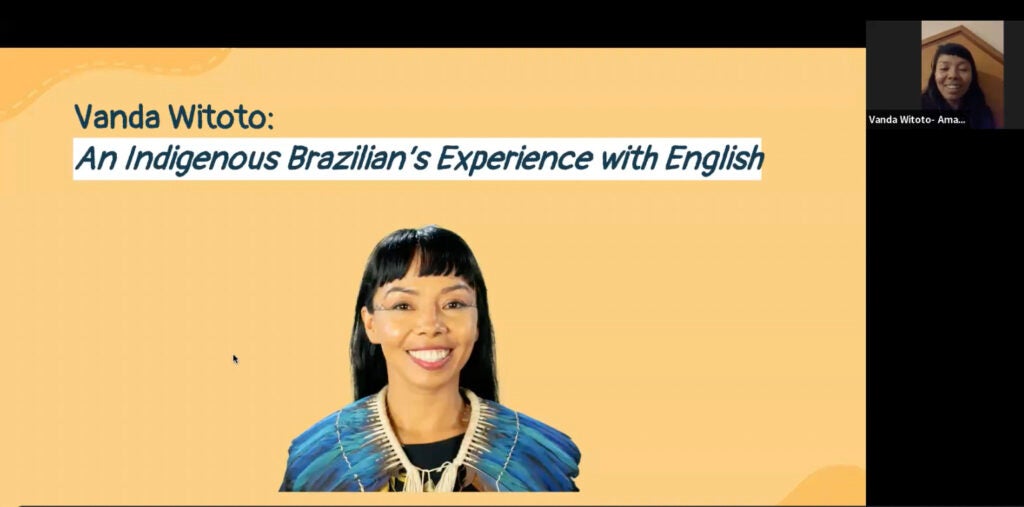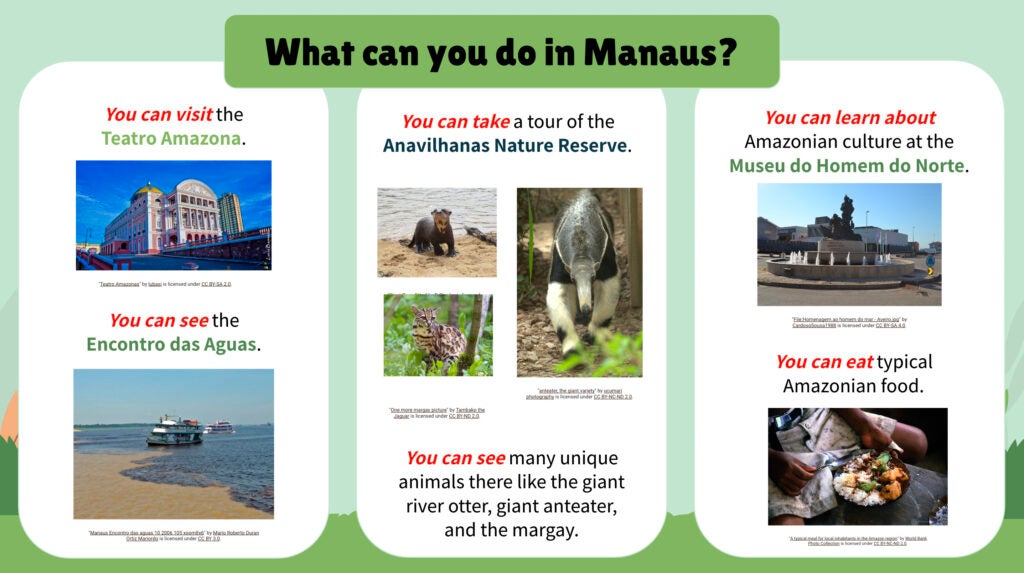I always imagined the project would serve as a two-way street in which I would be learning just as much about my students’ cultures as they would about mine, and I was not wrong!
Upon selection as a Virtual Educator for an online-teaching project in Brazil, Paige Poole felt that the role was a perfect fit. She already had prior experience teaching English in the U.S., England, and Colombia. While in Colombia, her interest in the Amazon region expanded, and she began learning Portuguese with Brazilian coworkers. Poole is passionate about supporting underserved communities and has worked to lift the voices of indigenous communities in Brazil throughout both of her Virtual Educator projects over the last year: Mobile English and English for Indigenous Communities.
The first course, Mobile English, lasted ten weeks and welcomed adult learners from 15 indigenous communities in Brazil. As the course title suggests, mobile phones and mobile internet were the key tools. The delivery modality for the course blended asynchronous tasks – using ChatClass, a Brazil-based edtech platform that integrates with WhatsApp – with synchronous video calls used as practice sessions.
Poole was then able to build on the success and framework of the first course with a follow-up 12-week course, English for Indigenous Communities, which followed a similar instructional model with the addition of completely original content.
Course Design with an ESP Focus for Activism
In designing the course, I bore in mind many aspects of English for Specific Purposes, aiming to make the course as aligned as possible with many of the students’ main goal in learning English: activism.
Through designing and implementing both courses, Poole was able to further her own professional development and ability as an instructor. This was her first experience teaching beginner English learners in an online environment. “I now feel much more prepared to teach and adapt materials for different levels of beginners and for different learning contexts.”
While developing the courses, Poole framed the learning tasks in an ESP lens. Being mindful of the needs of her students and their communities, Poole incorporated vocabulary and content around their shared interests and concerns. Notwithstanding the beginner English level of the class, learners took on the challenge of expressing their communities’ needs in relation to domestic and international affairs and the global climate crisis.
Earlier in 2023, Poole was able to broaden her impact domestically by sharing her project experience at the TESOL 2023 International Convention as part of the “U.S. Department of State Alumni Make an Impact in the Americas” panel. “I will continue to do what I can to help more and more English language learners of diverse backgrounds access and secure seats at the global table and to amplify the voices of their communities,” Poole says.
Connecting with an Activist Guest Speaker
I responded to her story telling her I was working with indigenous Brazilians in the Amazon as a Virtual Educator with the U.S. Embassy in Brazil.
One of the highlights of her Virtual Educator experience was welcoming guest speaker Vanda Witoto, an indigenous Brazilian activist, to her class for a presentation and discussion. Early in the Mobile English course, Poole discovered and reached out to Witoto after seeing her stories posted on social media relating how she felt the need to learn English in order to succeed while traveling and advocating internationally for indigenous communities in Brazil and the Amazon. After making this connection, Witoto joined the class for a discussion on her personal experiences of advocating to the international community at the Conference of the Parties to the United Nations Framework Convention on Climate Change in Egypt for greater rights and autonomy for indigenous communities in the Amazon region of Brazil.
Poole recalls Vanda Witoto telling her students, “If you understand English, if you know English, you can sit at a negotiation table, to talk, to propose, to present projects. If you can’t speak, you can’t sit [at the table] because people don’t have the patience [to wait for you to understand].” The chance to hear from and discuss with a notable local activist gave course participants an inspiring and authentic look at the role of activism in their home communities within the broader context of the global community.
Localizing Content and Learning Through Cultural Exchange
Every lesson was a teaching and learning experience for both me and my students – all of us sharing pieces of our cultures and identities.
Throughout both courses, Poole sought to facilitate learning by localizing as much course content as possible, making the language presented accessible and relatable for beginner English learners. Poole’s localized approach to the curriculum design assured that participants were “learning the English language vocabulary, structure, and skills they need for talking about and advocating for their communities with international audiences, including tourists.”
Learners mastered the phrase “you can” by creating sentences for English-speaking tourists about their own communities after analyzing an example centered on Manaus, the capital of the Brazilian state of Amazonas. “It was really rewarding to see students’ motivation and excitement increase when they were able to identify with the localized course content and materials,” Poole reflects.
During the second course, English for Indigenous Communities, Poole experienced a particularly memorable moment with a student from the Kayapo community during a conversation about what they eat and drink. Bringing a wooden dish filled with fruit extract, the student described the genipapo fruit and demonstrated its use in sacred rituals and body painting. He shared several videos about the rituals with Poole and expressed his wish to learn English as a way to make sure the world knows about his community, the Kayapo, and to ensure their survival.
Paige Michael Poole is originally from Hueytown, Alabama. She began her English language teaching journey while pursuing a B.A. in Spanish and International Studies at the University of Alabama. Realizing her passion for teaching English, she earned an M.A. in TESOL Studies from the University of Leeds. Paige has taught English to children and adolescents in the U.S., refugees and children in England, undergraduate students and adult learners in Colombia, and adult learners in Brazil. She has also led curricular projects with the Colombian Ministerio de Educación Nacional (National Ministry of Education) and the Secretaría Distrital de Educación (District Secretary of Education) in Barranquilla, Colombia. Her research and teaching interests include project and task-based learning, intercultural competence development, and technology enhanced language learning. She currently works from home full-time as Head of Project at Pangea Chat, developing an app that allows students to “learn a language while texting their friends,” and as a Virtual Educator in Brazil.
